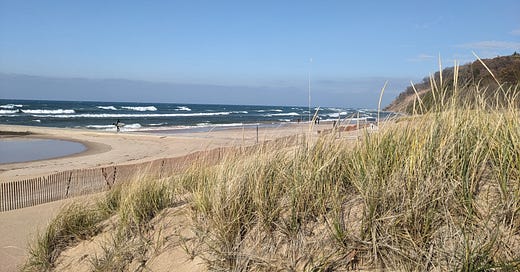To advocate, unmasked
What if neurodivergent folks are more prepared to do this work together now? Hasn’t liberation always been the point?
Something I realized this week: taking action toward a ceasefire in Gaza is the first major, global social change effort I’ve been able to participate in while knowing and understanding I’m neurodivergent.
I’ve been part of social change work since I was a teenager, including almost 15 years in a nonprofit career… a career where my unknown ADHD regularly energized (for the better) and rattled (for the worse) how I showed up.
I learned about my ADHD in late 2020, so that learning overlapped with Black Lives Matter and the election and more. But like many folks with late-identified neurodivergence, I’ve had a lot to unpack, unmask, and re-pattern (still do), so I wasn’t able to show up differently in those times of collective action. I participated, but I was still working from familiar impulses and social scripts I’d only just begun questioning.
Advocacy can have pitfalls for someone with ADHD. Especially hidden ADHD, and especially when the collective temperature rises and things get louder. As someone who is easily overstimulated, who is led by passion and hyperfocus, who can write and think feverishly but struggles to speak on the phone with even the most patient family members, I’ve gotten my fair share of things wrong and burned myself out along the way. My principles might have felt true, but my path to action was often tornado-like and unsustainable.
It’s not that neurodivergence is an excuse or cover here. Or that ADHD has been all bad for my social change work. I won’t apologize for my soft, electric heart. I’ve just needed more time and practice to figure out how to show up with it.
What I’m noticing (curious about) now is how understanding neurodivergence helps to find more ease in imperfection, more awareness to anticipate where I’m likely to get tripped up or burnt out in the midst of social change, and more spaciousness to keep going.
I know much more about myself now than I did in 2020. That means I can show up differently, and I have a better idea of where to get support—
—because a whole universe of neurodivergent community has taken shape online. For years, but especially since the start of the pandemic.
Thousands of us have gone deep into unmasking, finding new supports and stims, body doubling, creating spaces that tend to the needs of our divergent minds, trying new tools and learning aids, and so on. We’ve got a meme for every bad day or funny memory. We know the music that helps us focus, the meds that support and the meds that cause side effects, the particular weight of weighted blanket we need, the coaches and therapists who get it and the ones who don't…
As much as that work has been for our own joy and growth and health, doesn’t it also make us more prepared, more supported, to show up in this collective moment with Gaza? And other collective actions to come?
I keep thinking about the neurodivergent people in Gaza, who are trying to survive in the midst of constant noise and stimulation, little sleep, inconsistent or absent availability of food and water, crowded spaces, and, and and. And trying to get through without their usual support tools or even living family members who might understand. I keep thinking about the companion animals who have been killed or gone missing, knowing how important my dog is to navigating shutdowns and hard days.
So doesn’t our growing neurodivergent understanding and sense of community compel us to act? Hasn’t liberation, in its many forms and geographies and minds and bodies, always been the point?
I’m not trying to admonish anyone into action here. (This is the part where I overexplain myself and feed the familiar anxiety of being misunderstood—staying true to form, as ever.) What I’m really trying to say, with a great wave of love and curiosity, is: look at all this work and growth we’ve done together and how we might support each other through terrible times now. So many of us have come so far, celebrating and nudging each other along the way, reminding each other constantly that we’re not alone. What does that mean for how we can respond now?
I’ve been returning to a video Ijeoma Oluo shared about how she keeps herself going in work like this:
One of my most important rules: I do not debate the value of human life. I will not have a debate. It is demeaning. It is cheapening. It gives to the idea that there’s a debate to be had over whether or not certain populations deserve to live. We know they do. And I will state that unapologetically and I will not make time for people who are trying to say that they won’t. That is so far away from where we need to start work to get progress.
Since listening to this, I’ve noticed how powerful and noise-clearing it is to stay grounded in what I will not say and will not debate… rather than searching for some perfect arrangement of what I “should” say or do.
Every morning I reconnect with myself on this, before I read the latest news and check in on Bisan. This guidance has helped me feel more centered, ready to listen well and act where the need truly is. This has helped me avoid a wilderness of tempting rabbit holes that would only be disheartening and distracting in the end.
Ijeoma also happens to have ADHD. When I listen to and read her posts, that’s one of the lenses that’s with me: this is someone who is wired like I am, so it’s possible her practices might feel like a good, natural fit to try.
I’ve also been following the lead of
, an audhd writer. They posted a video on how they’re scripting their calls to representatives and then actually modeled the calls—please watch if the thought of picking up the phone and calling a senator freaks you out:I’m a little embarrassed about how much it helped me to watch this... my earlier career means I should already know how to do this work with gusto. But all of that was when I was masking up and powering through, having no idea why I often left those (traditional, neuro-normative) spaces feeling like a weird, overexposed, overextended, fried-up alien-mess.
For me, unmasking has included a strange trade-off: I'm no longer good at some of the skills that came with the roles I used to play. A chunk of my confidence and skill set was apparently glued to the claustrophobia-comfort of the mask.
So it helps to have things broken down by a fellow neurodivergent person. To get a sense of exactly how they pace themselves when doing this kind of work. Pacing is one of my biggest challenges with ADHD. And the urgency of social change, especially when we’re talking about war, hyper-activates my all-or-nothing, now-or-never temperament (a gateway to burnout).
This is where a neurotypical person might suggest “just make a list and break it down” or “just get it done, it’s just one phone call.”
Instead, Jezz models the pacing, offers concrete scripting, and even suggests where to breathe… without ever saying it’s “just” anything. In fact, they take another pause to acknowledge and honor the heaviness of this work.
So many of the posts I’m reading and watching like this are from neurodivergent people of color. They’re consistently putting themselves out there, guiding their followers to action, and creating tons of teaching resources and care spaces along the way. The neurodiversity movement is intertwined with/owes much to movements for racial and disability justice—that always feels especially clear in moments like this. The intersections reveal a lot about who is taking solidarity, justice, and liberation to heart.
Which is also to say hello to fellow white neurodivergent folks… if you’ve learned more about your neurodivergence through and been supported by neurodivergent folks of color, how are you listening with them and acting with them now related to Gaza? Are you open to being in relationship with the wholeness of their perspective and lived experience—not just the parts you find most useful or affirming to your own identity?
This isn’t a pause from the regularly scheduled programming of neurodivergence content. It’s an extension of it, another chapter. This learning and advocacy and push for safety, peace, liberation is bound together with the neurodiversity movement and the racial justice movement and the disability movement and… it’s all connected.
I’m going to leave you with this moment from the water here in Michigan, because that’s where I need to go in heavy times.
I've been going to the water when it feels like I've done all I can with calls and prayers and reading and watching and taking in. The water makes sure I stay soft.
I've been going west, to the water, and thinking of people in Gaza, going west, to the water. I've been thinking of this little movement of my body, west, to the water, as a kind of solidarity.
I've been thinking of parallels and symmetry and shorelines. I live in the smallest county in Michigan, where the Lake Michigan shoreline stretches for 25 miles. 25 miles—also the length of Gaza, stretching along the Mediterranean Sea.
I've been thinking of our two inland seas, in conversation. In the way that only water can draw a conversation. In the way that water is always free to move, to rise, to change.







Thank you for this <3
Thank you for this Emily, I've had very similar thoughts over the last month about what I am able to give and how I manage my limitations since my diagnosis!